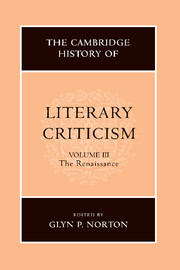Book contents
- Frontmatter
- Introduction
- READING AND INTERPRETATION: AN EMERGING DISCOURSE OF POETICS
- POETICS
- THEORIES OF PROSE FICTION
- CONTEXTS OF CRITICISM: METROPOLITAN CULTURE AND SOCIO-LITERARY ENVIRONMENTS
- VOICES OF DISSENT
- STRUCTURES OF THOUGHT
- NEOCLASSICAL ISSUES: BEAUTY, JUDGEMENT, PERSUASION, POLEMICS
- A SURVEY OF NATIONAL DEVELOPMENTS
- 56 Seventeenth-century English literary criticism: classical values, English texts and contexts
- 57 French criticism in the seventeenth century
- 58 Literary-critical developments in sixteenth-and seventeenth-century Italy
- 59 Cultural commentary in seventeenth–century Spain: literary theory and textual practice
- 60 The German-speaking countries
- 61 The Low Countries
- Bibliography
- Index
- References
60 - The German-speaking countries
from A SURVEY OF NATIONAL DEVELOPMENTS
Published online by Cambridge University Press: 28 March 2008
- Frontmatter
- Introduction
- READING AND INTERPRETATION: AN EMERGING DISCOURSE OF POETICS
- POETICS
- THEORIES OF PROSE FICTION
- CONTEXTS OF CRITICISM: METROPOLITAN CULTURE AND SOCIO-LITERARY ENVIRONMENTS
- VOICES OF DISSENT
- STRUCTURES OF THOUGHT
- NEOCLASSICAL ISSUES: BEAUTY, JUDGEMENT, PERSUASION, POLEMICS
- A SURVEY OF NATIONAL DEVELOPMENTS
- 56 Seventeenth-century English literary criticism: classical values, English texts and contexts
- 57 French criticism in the seventeenth century
- 58 Literary-critical developments in sixteenth-and seventeenth-century Italy
- 59 Cultural commentary in seventeenth–century Spain: literary theory and textual practice
- 60 The German-speaking countries
- 61 The Low Countries
- Bibliography
- Index
- References
Summary
The vitality of intellectual life in the German-speaking lands of the Holy Roman Empire during the late fifteenth and early sixteenth centuries is reflected in the contribution made by German scholars and writers to humanism and, more particularly, to Renaissance poetics. Even before the new invention of printing became established, access to high-quality Latin texts ranging from antiquity to the early Renaissance had been made easier by the anthology compiled by Albrecht von Eyb and entitled Margarita poetica (Strasburg, 1459; first printed Nuremberg, 1472). This influential compendium reinforced the conviction that careful reading of texts with a view to imitation was an essential element of education and intellectual improvement, an approach which was to be sustained throughout the long period under discussion here. De arte versificandi (1511) by Ulrich von Hutten advocated similar principles, this time in the context of a manual of poetry based on the accepted assumption that the study of good models is an essential part of the poet's training. As a humanist, Hutten also emphasizes the need for wide-ranging knowledge on the poet's part, a requirement already put forward in even more ambitious terms by Germany's greatest humanist writer, Conrad Celtis, in his Ars versificandi et carminum (c. 1486), a manual which offers sound guidance by an expert practitioner of neo-Latin verse who was convinced that between them ars, usus, and imitatio provided the basic essentials for creative success. Thus the close relationship between reading, study, and creativity became firmly established as an essential feature of literary theory and practice in Germany for a long time to come.
- Type
- Chapter
- Information
- The Cambridge History of Literary Criticism , pp. 591 - 599Publisher: Cambridge University PressPrint publication year: 1999

